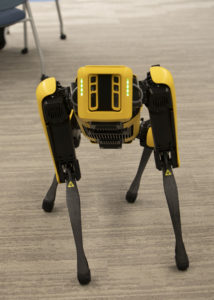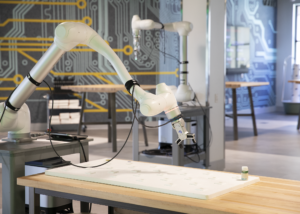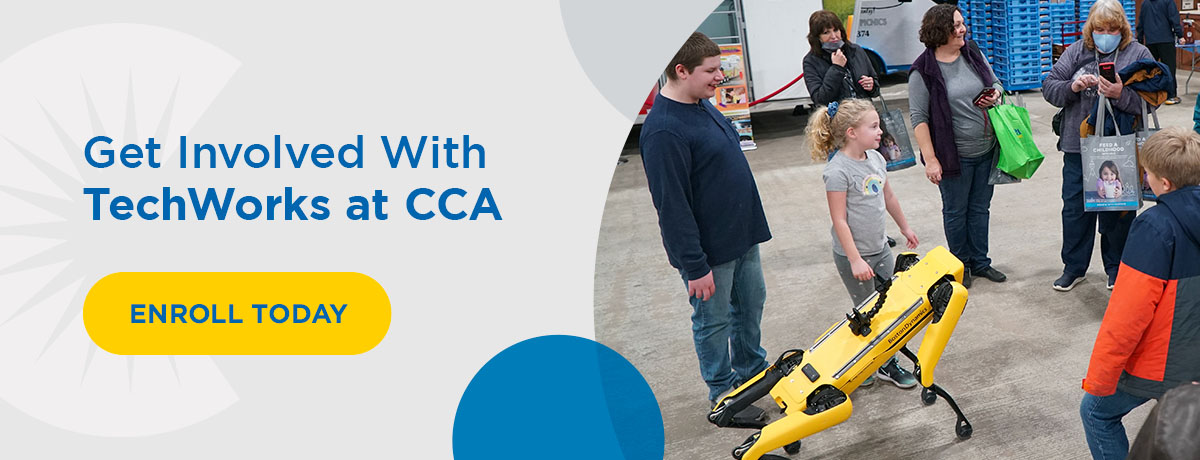Robotics in Education
With TechWorks at CCA®, robotics can be a part of any CCA learner’s educational journey.
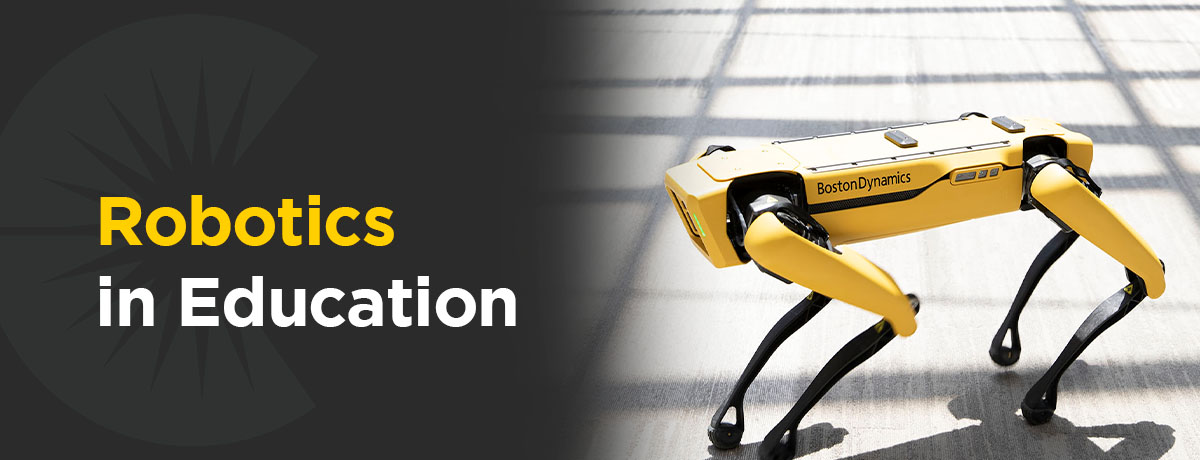
Robotics is changing the face of education as an engaging way to foster better learning and development while equipping students with the knowledge they need to stay competitive in an automated world. Let’s take a closer look at this growing field of education and how CCA empowers students to pursue innovation and lifelong learning.
What Is Robotics?
Robotics refers to the act of creating, building, and managing autonomous and human-controlled robotic systems. It involves skills like:
- Programming
- Engineering
- Creative design
- Coding
- Physics
- Mathematics
- Software development
Industrial robots have long played a role in manufacturing, but within the past decade, interest has risen in new and more advanced roles for robots in our society. Robots have, for example, proven an integral part of life-saving surgeries and even help fight fires.
Learning robotics is a hands-on approach to engaging with scientific principles that ultimately leads to world-changing results. Students with an interest in robotics often have a deep curiosity to figure out how things work, paired with patience and persistence to try new things and learn from their failures.
K-12 schools across the country have instituted robotics programs as part of the larger movement toward science, technology, engineering, and math (STEM) education.
Benefits of a Robotics Education
A robotics education enhances the teaching and learning experience, imbuing students with soft and hard skills they’ll carry with them into their future careers. It can also be a lot of fun and a great way to inspire natural curiosity!
Learning STEAM Principles
Robotics infuses elements of several different academic disciplines, especially science, technology, engineering, art, and math (STEAM):
- Science: Robotics positions students to embrace the scientific method as they observe, create and test theories, and understand and apply results. It also incorporates advanced scientific principles like thermodynamics and physics.
- Technology: Students will experiment with writing and implementing codes, planning algorithms, manipulating processes and interfaces, and building software. Robotics also involves the use of programming languages like C++ and Python.
- Engineering: Designing and managing a robot requires an understanding of electrical systems and mechanical design, automation, structural analysis, and various types of hydraulic and pneumatic systems.
- Art: Despite the technical nature of robotics, the field requires a great deal of creativity. Students interact with computer-assisted design and drafting software to sketch out designs and bring concepts to life. They must also consider factors like form and materials and how those influence a robot’s overall function.
- Math: Students incorporate learning from multiple areas of mathematics, such as statistics, algebra, calculus, and geometry, to understand and implement movement, behavior, and algorithmic functioning.
A well-rounded STEAM education builds a strong foundation for college and careers and has been shown to inspire ongoing creativity in students. Learners at CCA have even used the skills they’ve gained to pass on these principles to others — the student-created nonprofit Yellow Brick Robotics teaches kids how to use Lego bricks to make robots and engage with STEM.
Cognitive and Social Development
Participating in robotics can help students grow their cognitive abilities and build social skills. They’ll pick up traits like:
- Teamwork and collaboration
- Independent thought
- Trial and error
- Adaptability
- Creativity and out-of-the-box thinking
- Complex problem-solving
- Pre-planning and execution
One study found that a robotics education can help improve a student’s visuospatial, logical, and abstract reasoning skills, as well as their ability to focus and process information faster. Data even revealed that students perceived robotics activities similarly to playing games, so kids have fun while they’re developing critical attributes.
Career-Readiness
Robots have become key players across all industries, including some not-so-obvious ones. For example, our students explored the relationship between robotic automation and agriculture by developing an auto seeder that saves time and promotes sustainability. The skills students acquire in a robotics education will set them up for success in their future college education and professional careers.
Inclusive Classrooms
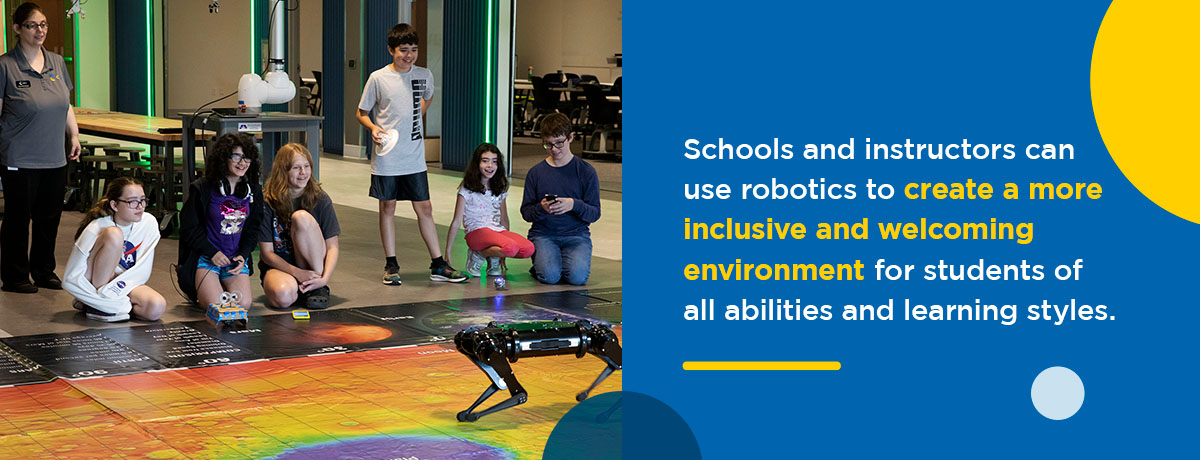
Schools and instructors can use robotics to create a more inclusive and welcoming environment for students of all abilities and learning styles. Robotics programming is diverse and can adapt to each child’s unique needs, assisting with things like non-verbal communication and creating a multi-sensory experience. They’ve been used to bridge gaps and improve visual, auditory, and language accessibility. When armed with tools like artificial intelligence, robotics can even help detect patterns that could indicate learning disabilities.
Robotics at CCA
To best prepare our students for real-world scenarios and provide hands-on educational practice, TechWorks at CCA®, a CCAWorks® program, provides practical training utilizing robotics. TechWorks at CCA provides students with career-focused, hands-on lab and technical education. Learners explore various tech-related topics such as robotics, manufacturing, computer science, coding, cybersecurity, virtual reality, and drones.
Through both in-person and virtual programming, CCA students can discover future career opportunities and earn industry credentials and certifications. CCA develops a pipeline so our learners graduate ready to be contributing members of the workforce.
Why Use Robots?
With a career-driven educational program, TechWorks at CCA provides students with real-world, transferable skills. Our robotics programming exposes learners to coding and computer science alongside programming, constructing, operating, and repairing robots.
“Robotics can be found everywhere in our lives and are designed to complete tasks that are dull, dirty, or dangerous. We want our learners to be comfortable and confident in their interactions with robots and to see the value they can add to all of our lives.” – Debbie Reynolds, Director of TechWorks at CCA.
Students gain access to education robots starting in elementary grades, where they learn the foundations of technological robotics and begin developing coding skills. As they progress, students can learn how to operate, program, build, and code various robots. With their development of skills such as JavaScript and Python, students can earn industry certifications, making their education transferable to their CCA coursework and future workplaces.
Meet CCA’s Robots
TechWorks at CCA supplies learners with various makes and models of the most robust robotics. The program exposes learners to both commercial and educational robots, such as:
Boston Dynamics Spot Autonomous Robot:
- Weight: 71 pounds
- Payload: 30 pounds
- Top speed: 1.6 meters per second
- Max run time: 1.5 hours
- Charge time: 1 hour
- Operation: Controller operated
The Ghost Robotics Vision 60 Quadruped Robot:
- Weight: 112 pounds
- Payload: 22 pounds
- Top speed: 3 meters per second
- Max run time:> 3 hours
- Operation: Controller operated
The Doosan Collaborative Robotic Arm:
- Weight: 60 pounds
- Payload: 55 pounds
- Top speed: 1 meter per second
- Total reach: 4.25 feet
- Operation: Controller operated
A favorite among students, our Boston Dynamic robotic dog Spot has even learned to dance and engage with others! With flexible options such as Vex robotic kits and even Sphero BOLT robotic balls, CCA learners can hone robotic skills and get involved in STEAM programming.
Get Involved With TechWorks at CCA
With TechWorks at CCA, robotics can be a part of any CCA learner’s educational journey. From virtual coding classes, engaging club options, in-person camps, internships, and more, learners can find how TechWorks at CCA can work for them. With the advancement of technology, having foundational skills in robotics sets CCA learners above the rest.
Keep up with exciting initiatives in CCAWorks and the many other happenings at Commonwealth Charter Academy by subscribing to our YouTube channel, or request more information about enrollment today!



